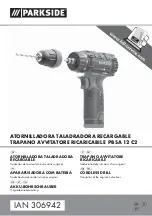
BOP-1K-GL 111315
3-29
3.5.9
ERROR MESSAGE EXPLANATIONS
Refer to Table B-5 for an explanation of error messages returned by the SYST:ERR? (PAR.
B.132) query.
3.6
PROGRAMMING USING DIGITAL CONTROL
BOP models may be digitally programmed over a control bus using SCPI (Standard Commands
for Programmable Instruments). SCPI provides a common language conforming to IEEE 488.2
for instruments used in an automatic test system (see PAR. 3.7). The control bus used must be
either the IEEE 488 standard communication bus (General Purpose Interface Bus, GPIB), or the
RS 232C Serial Bus.
Refer to Table 2-13 for input/output signal allocations for communication via the GPIB, Table 2-7
for RS 232, and Table 2-4 for the BITBUS.
This section includes a discussion of GPIB bus protocols (PAR. 3.6.3), instructions for changing
the GPIB address (PAR. 3.6.3.1.1), RS 232C Operation (PAR. 3.6.4), a discussion of the VISA
(Virtual Instrumentation Software Architecture) driver supplied with the unit (PAR. 3.6.5), fol-
lowed by a detailed explanation of SCPI programming (PAR. 3.7).
When either of the two interface ports are in use, PAR’s 3.6.3.1 (GPIB) and 3.6.4.3 (RS 232)
describe how to configure the port to meet the user’s requirements.
TABLE 3-7. OPERATION OF #RST COMMAND
Load type when *RST
Issued (see NOTE)
BOP Status After *RST Issued
•
Active or Resistive Load
(see PAR. 3.5.5)
•
Voltage mode
•
Main Channel reference set to 0.0V
•
Current protect set to 5% of
I
Onom
•
Voltage protect set to 5% above
E
Onom
•
Battery Load (see PAR.
3.5.5)
•
If
*RST set to
ON, unit is set to Voltage Mode
•
If
*RST set to
OFF unit is set to Current Mode
•
Main Channel reference set to 0.0A
•
Current protect set to 5% of
I
Onom
•
Voltage protect set to 5% above
E
Onom
NOTE: Prior to issuing *RST unit may be operating in either voltage mode or
current mode.
Summary of Contents for BOP-GL 1KW
Page 2: ......
Page 10: ......
Page 20: ...x BOP 1K 111315 FIGURE 1 1 HIGH POWER BOP GL SERIES POWER SUPPLY...
Page 36: ...1 16 BOP 1K GL 111315 FIGURE 1 3 BOP OUTPUT CHARACTERISTICS...
Page 38: ......
Page 116: ......
Page 128: ......
Page 174: ......
















































